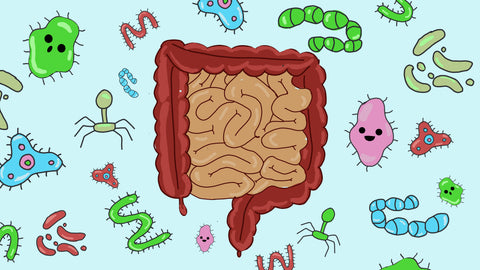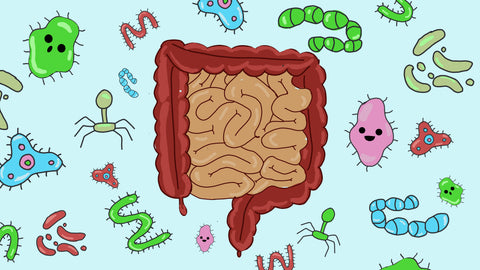
The idea that we have bacteria in our gut may make us freak out because the word Bacteria is linked more often to the word disease. But don't worry, the bacteria living in our gut are there for a good cause. In fact, they play a big role in our health and wellbeing.🙂
The foods that we eat can strengthen or weaken our gut microbiome. The more gut bacteria get what they need to thrive, the better for our own survival and wellbeing. Having bacteria in our intestines lets us extract much more nutrition from the food that we eat.
How it Works, a science magazine reported in their issue 135 that in Japan, for example, some people have a gut bacteria called Bacteroides plebeius. It comes from the seaweed in their diet, and it makes an enzyme that can digest complex sugar found in red algae. Without the enzyme, the sugar would just pass straight through. Thanks to the bacteria, the sugar becomes a new source of energy.
Gut bacteria also seem to be liked with to a healthy heart, weight control, minimizing the impact of allergies and asthma, and a host of other benefits.

It's estimated that there are between 30 to 50 trillion bacterial cells inside the human body. That means that we are only half human at best
Keep your bacteria community heathy
Like any ecosystem, a delicate act of balancing is the key to maintain a healthy community. There are hundreds of species living in our gut, if this complex mix gets out of balance, our overall wellness could be compromised. All kinds of diseases had been linked to problems with the microbiome, from diarrhea to acne to diabetes and cancer.
The good news is that it doesn't take much to take care of our beloved tenants.😊
All we need to do is eating the right food that keeps them flourishing.🥦🍆🥬🍎
Although there are many types of foods gut bacteria crave, they seem to not be able to survive without fibers. The more plant-based foods we eat, the more bacteria you support, and there are benefits for you too. When fiber-eating bacteria feed, they make fatty acids, which nourish our gut cells, help to maintain our gut barrier, and reduce inflammation.

Roughly 70% of our immune system is located with in the gut.
6 Best fruits to improve digestion
Here are 5 lifestyle actions recommended by EHE Health to support a healthy microbiome.
1. Eat more fiber
Good fiber consumption feeds your gut bacteria and helps them thrive. Experts suggest shooting for at least 25 grams per day for women, 38 for men. Fiber can contribute to reduced risks of major health problems including cancer and obesity. To get the fiber you need, limit processed foods and opt for whole grains, fruits and vegetables, and legumes. Along with water and other healthy food choices, fiber helps you feel full and keeps your digestive tract healthy, which is needed for weight control and immune system health.
2. Take a probiotic, eat fermented foods
Probiotics are often referred to as the “good bacteria” in your gut. The two common groups of these healthy bacteria are Lactobacillus and Bifidobacterium. Some research points to reduced gut inflammation when people take a probiotic supplement. You can also get probiotics naturally by consuming fermented foods such as kefir, kombucha, sauerkraut, and tempeh.
3. Avoid foods that are bad for the gut
General guidelines for a positive microbiome diet include avoiding certain foods that may harm the gut. Those can include trans and hydrogenated fats, sugar, and high-fructose corn syrup. (Fortunately, you can avoid a lot of these ingredients just by skipping processed foods!) You should also monitor your intake of eggs and dairy, yeast, and foods with gluten.
4. Start a ‘good’ foods list
Just as you should avoid processed foods, there are also great gut-friendly foods you’ll want to eat. Wild salmon and grass-fed meat, along with non-starchy fruits and vegetables such as carrots, garlic, asparagus, apples, oranges, nectarines, cherries and kiwi, all promote a healthy microbiome. Nuts, seeds, olive oil and certain herbs and spices are also welcome with a microbiome-healthy diet.
5. Avoid, or stop, smoking
Smoking is tied to numerous health concerns, including cancer, and even second-hand smoke can have negative effects on the gut, too. Some research suggests smoking can increase the colonization of pathogenic bacteria in the microbiome. If you smoke, reach out to a smoking cessation program and make quitting a top priority, not just for your gut, but for many other health reasons as well.
Before making significant lifestyle changes to improve gut health, it’s important to consult with a medical professional. Working with a physician is the best way to help assure you are making the right decisions that take into account your unique health circumstances and needs.
The growth of bad bacteria is controlled by the good bacteria as they compete for nutrition and attachment sites in the intestine. Good bacteria also secrete a substance in the intestine that kills bad bacteria.





Comments (0)
There are no comments for this article. Be the first one to leave a message!